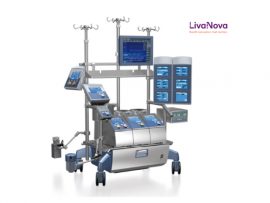Abstract Extracorporeal membrane oxygenation (ECMO) is a mechanical circulatory and respiratory support system that facilitates gas exchange and hemodynamic stabilization through an external circuit. ECMO has been increasingly utilized for..
Read MoreAbstract The challenging management of coagulation in cardiothoracic surgery requires a multifaceted approach. The use of pharmacological interventions such as tranexamic acid, heparin, and aprotinin minimizes bleeding but increases the..
Read MoreAbstract For patients undergoing extracorporeal membrane oxygenation (ECMO), clot formation is a critical complication requiring high-risk circuit changes. Blood tests used to assess clotting risk may be drawn only four..
Read MoreAbstract Background Evidence for the effectiveness of the Sonoclot analyzer in improving clinical outcomes in disseminated intravascular coagulation (DIC) is lacking. Objective To evaluate the effectiveness of an algorithm based..
Read MoreAbstract Background Evidence for the effectiveness of the Sonoclot analyzer in improving clinical outcomes in disseminated intravascular coagulation (DIC) is lacking. Objective To evaluate the effectiveness of an algorithm based..
Read MoreAbstract Importance Excessive bleeding is a common and prognostically important complication of cardiac surgery. For bleeding related to coagulation factor deficiency, frozen plasma is the most used therapy. Preliminary trials indicate..
Read MoreAbstract The currently available point-of-care hemostasis tests are burdened by criticisms concerning the use of different activators and inhibitors and the lack of dynamic flow. These operating conditions may constitute..
Read MoreAbstract Background: Individuals undergoing cardiac surgery face an increased risk of bleeding, as well as alterations in biochemical and coagulation patterns. Therefore, assessing the effectiveness of systems such as Cell..
Read MoreAbstract Background Coagulatory alterations are common after pediatric cardiac surgery and can be addressed with point-of-care (POC) coagulation analysis. The aim of the present study is to evaluate a preventive..
Read MoreAbstract Introduction Bleeding and thrombotic events (BTE) are frequent during extracorporeal membrane oxygenation (ECMO). They occur at varying timepoints and may be affected by temporal changes in coagulation and fibrinolysis...
Read MoreAbstract Blood surface interfacing that occurs within the extracorporeal membrane oxygenation (ECMO) circuit initiates contact activation, an important hemostatic pathway initiated by the Hageman factor, also called factor XII. Factor..
Read MoreAbstract The intricate management of hemostatic disorders in extracorporeal membrane oxygenation (ECMO) assisted patients poses challenges, particularly when procoagulant administration is necessary. We hereby report the performance of the Nautilus*..
Read MoreAbstract Extracorporeal membrane oxygenation (ECMO) is a type of circulatory life support for patients with severe lung failure. The use of ECMO has increased worldwide since the pandemic of H1N1..
Read MoreAbstract It is believed that a lower temperature setting of hypothermic circulatory arrest (HCA) in thoracic aortic surgery causes coagulopathy, resulting in excessive bleeding. However, experimental studies that eliminate clinical..
Read MoreAbstract OBJECTIVES The use of cardiopulmonary bypass (CPB) in cardiac surgery is a major risk factor for postoperative bleeding. We hypothesized that consumptive coagulopathy and haemodilution influence the coagulation factors;..
Read MoreAbstract Background Cardiopulmonary bypass (CPB) causes coagulation disorders after surgery. This study aimed to compare the coagulation parameters after congenital cardiac surgery with miniaturised CPB (MCPB) versus conventional CPB (CCPB)...
Read MoreAbstract Background Extracorporeal life support (ECLS) has extensive applications in managing patients with acute cardiac and pulmonary failure. Two primary modalities of ECLS, cardiopulmonary bypass (CPB) and extracorporeal membrane oxygenation..
Read MoreAbstract Background A multidisciplinary Quality Assurance/Performance Improvement study to identify the incidence of “heparin rebound” in our adult cardiac surgical population instead detected a thromboelastometry pattern suggestive of initial protamine..
Read MoreAbstract Bleeding is a leading cause of perioperative mortality []. In a perioperative setting, damage control surgery with massive transfusion protocols (MTPs) are therapeutic approaches used clinically to manage patients..
Read MoreAbstract Introduction Off-pump coronary artery bypass grafting (OPCABG) was introduced many years ago aiming to reduce the known complications of conventional on-pump coronary surgeries. Heparin is required during the procedures,..
Read MoreAbstract Objective No recent prospective studies have analyzed the accuracy of standard coagulation tests and thromboelastography (TEG) to identify patients with excessive microvascular bleeding following cardiopulmonary bypass (CPB). The aim..
Read MoreAbstract 2021 and the COVID 19 pandemic have brought unprecedented blood shortages worldwide. These deficits have propelled national efforts to reduce blood usage, including limiting elective services and accelerating Patient..
Read MoreAbstract Background Extracorporeal membrane oxygenation (ECMO) represents an advanced option for supporting refractory respiratory and/or cardiac failure. Systemic anticoagulation with unfractionated heparin (UFH) is routinely used. However, patients with bleeding..
Read MoreAbstract Introduction Our study aim was to explore how different protamine-heparin ratios impacted enzymatic coagulation and acellular fibrin clot growth in plasma using an in vitro model. We hypothesized that..
Read MoreAbstract Background: The optimal monitoring strategy for anticoagulation management in extracorporeal membrane oxygenation (ECMO) remains a clinical controversy. The Extracorporeal Life Support Organization Anticoagulation Guidelines suggest that multiple anticoagulation assays..
Read MoreAbstract Objectives Extracorporeal membrane oxygenation (ECMO) involves complex coagulation management and frequent hemostatic complications. ECMO practice between centers is variable. To compare results between coagulation studies, standardized definitions and clear..
Read MoreAbstract Intraoperative haemostasis is of paramount importance in the practice of cardiovascular surgery. Over the past 70 years, topical haemostatic methods have advanced significantly and today we deal with various..
Read MoreAbstract Major blood loss remains common in cardiac surgery with an incidence of up to 15%. Bleeding leads to anemia and blood product transfusion, and can lead to the need..
Read MoreAbstract Introduction We performed in vitro experiments using whole human blood without anticoagulants to clarify the activity of anticoagulant proteins on membranes coated with acrylate-copolymer (ACP) with a hydrophilic blood-contacting layer compared..
Read MoreAbstract Viscoelastic hemostatic assays (VHA) are point of care tests that allow for a global assessment of coagulation using whole blood. The technology to allow this assessment has evolved from..
Read More













